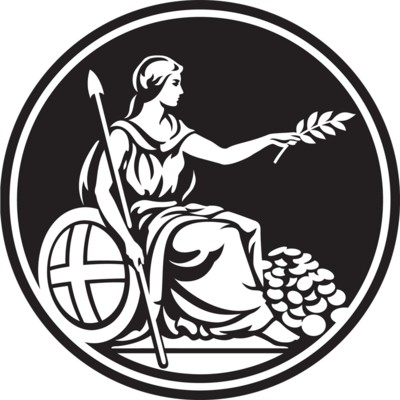Navigating the Economic Storm: The Impact of Tariffs on the UK Economy
April 25, 2025, 10:04 pm

Location: United Kingdom, England, London
Employees: 1001-5000
Founded date: 1694

Location: United States, District of Columbia, Washington
Employees: 1001-5000
Founded date: 1944
Total raised: $33.23M
In the swirling waters of global trade, the UK finds itself at a crossroads. The Bank of England, under the leadership of Governor Andrew Bailey, is grappling with the implications of U.S. tariffs. These tariffs, introduced by President Trump, are more than just numbers on a balance sheet; they are waves that could either lift or drown the UK economy.
Bailey's recent comments highlight a dual concern: the potential for a "growth shock" and the specter of inflation. The governor is acutely aware that tariffs can create ripples across the economic landscape. They can slow growth, disrupt supply chains, and ultimately affect consumer prices. In an interview, he expressed a cautious optimism about a potential trade deal with the U.S., suggesting that such an agreement could provide a lifeline. However, he remains wary of the broader implications of a fragmented global economy.
The Bank of England is preparing for its May monetary policy meeting, where it will weigh the effects of tariffs against domestic supply constraints. This balancing act is no small feat. On one hand, tariffs could redirect trade flows, potentially easing inflation. On the other, retaliatory measures could send prices soaring. Bailey's analysis reveals a complex interplay between demand and supply, with the weak supply side posing a risk to inflation.
Recent data from the International Monetary Fund (IMF) paints a sobering picture. The IMF has downgraded the UK's growth forecast to 1.1% for 2025, down from 1.6%. This revision underscores the challenges posed by rising energy costs and the uncertainty surrounding U.S. trade policies. Bailey acknowledges that while the UK is not on the brink of recession, the economic uncertainty is palpable. Business and consumer confidence are fragile, like glass teetering on the edge of a table.
Inflation, currently at 2.6%, is expected to rise. Bailey anticipates that energy prices and other domestic pressures will contribute to this uptick. However, he reassures that the increase will not mirror the dramatic spikes seen in previous years. The Bank of England's Monetary Policy Committee (MPC) is expected to cut interest rates, a move that reflects the urgency of the situation. Markets are already pricing in a reduction to 4% by August.
The tariffs, particularly the 25% levies on steel, aluminum, and autos, have created a ripple effect. They are not just numbers; they represent a shift in the economic landscape. The UK, with its open and service-oriented economy, is particularly vulnerable. A slowdown in global trade could have cascading effects, impacting everything from manufacturing to consumer spending.
Bailey's comments also touch on the broader implications of the U.S.-UK relationship. He emphasizes that the interconnectedness of the global economy means that local decisions can have far-reaching consequences. The UK is not an island; it is part of a larger economic ecosystem. Fragmentation, he warns, will be detrimental to growth.
The governor's stance on the safety of the U.S. dollar as a reserve currency is also noteworthy. He downplays fears surrounding the dollar's stability, suggesting that a significant shift in reserve currency dynamics is unlikely. The structure of global markets is deeply entrenched, and any change would require monumental shifts in policy and perception.
As the Bank of England navigates these turbulent waters, transparency will be key. Bailey and his team must communicate their decisions clearly to maintain confidence among investors and consumers. The MPC's approach to interest rates and inflation must be flexible, adapting to the ever-changing economic landscape.
In conclusion, the UK faces a challenging economic environment shaped by external pressures and internal dynamics. The impact of U.S. tariffs looms large, casting a shadow over growth prospects. As the Bank of England prepares to respond, the delicate balance between managing inflation and fostering growth will be critical. The road ahead is fraught with uncertainty, but with careful navigation, the UK can weather the storm. The key will be to remain vigilant, adaptable, and transparent in the face of change. The economic tides may shift, but with the right strategies, the UK can find its way to calmer waters.
Bailey's recent comments highlight a dual concern: the potential for a "growth shock" and the specter of inflation. The governor is acutely aware that tariffs can create ripples across the economic landscape. They can slow growth, disrupt supply chains, and ultimately affect consumer prices. In an interview, he expressed a cautious optimism about a potential trade deal with the U.S., suggesting that such an agreement could provide a lifeline. However, he remains wary of the broader implications of a fragmented global economy.
The Bank of England is preparing for its May monetary policy meeting, where it will weigh the effects of tariffs against domestic supply constraints. This balancing act is no small feat. On one hand, tariffs could redirect trade flows, potentially easing inflation. On the other, retaliatory measures could send prices soaring. Bailey's analysis reveals a complex interplay between demand and supply, with the weak supply side posing a risk to inflation.
Recent data from the International Monetary Fund (IMF) paints a sobering picture. The IMF has downgraded the UK's growth forecast to 1.1% for 2025, down from 1.6%. This revision underscores the challenges posed by rising energy costs and the uncertainty surrounding U.S. trade policies. Bailey acknowledges that while the UK is not on the brink of recession, the economic uncertainty is palpable. Business and consumer confidence are fragile, like glass teetering on the edge of a table.
Inflation, currently at 2.6%, is expected to rise. Bailey anticipates that energy prices and other domestic pressures will contribute to this uptick. However, he reassures that the increase will not mirror the dramatic spikes seen in previous years. The Bank of England's Monetary Policy Committee (MPC) is expected to cut interest rates, a move that reflects the urgency of the situation. Markets are already pricing in a reduction to 4% by August.
The tariffs, particularly the 25% levies on steel, aluminum, and autos, have created a ripple effect. They are not just numbers; they represent a shift in the economic landscape. The UK, with its open and service-oriented economy, is particularly vulnerable. A slowdown in global trade could have cascading effects, impacting everything from manufacturing to consumer spending.
Bailey's comments also touch on the broader implications of the U.S.-UK relationship. He emphasizes that the interconnectedness of the global economy means that local decisions can have far-reaching consequences. The UK is not an island; it is part of a larger economic ecosystem. Fragmentation, he warns, will be detrimental to growth.
The governor's stance on the safety of the U.S. dollar as a reserve currency is also noteworthy. He downplays fears surrounding the dollar's stability, suggesting that a significant shift in reserve currency dynamics is unlikely. The structure of global markets is deeply entrenched, and any change would require monumental shifts in policy and perception.
As the Bank of England navigates these turbulent waters, transparency will be key. Bailey and his team must communicate their decisions clearly to maintain confidence among investors and consumers. The MPC's approach to interest rates and inflation must be flexible, adapting to the ever-changing economic landscape.
In conclusion, the UK faces a challenging economic environment shaped by external pressures and internal dynamics. The impact of U.S. tariffs looms large, casting a shadow over growth prospects. As the Bank of England prepares to respond, the delicate balance between managing inflation and fostering growth will be critical. The road ahead is fraught with uncertainty, but with careful navigation, the UK can weather the storm. The key will be to remain vigilant, adaptable, and transparent in the face of change. The economic tides may shift, but with the right strategies, the UK can find its way to calmer waters.